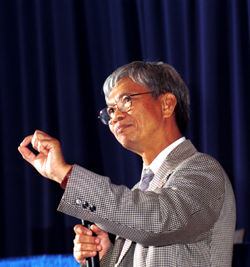|
 Dith Pran, a photojournalist with The New York Times, spoke candidly Tuesday night, April 9, about his starvation and torture in the forced labor camps of Cambodia from 1975-79 in a lecture titled “Cambodia’s Killing Fields: Memoirs of a Survivor.” Dith Pran, a photojournalist with The New York Times, spoke candidly Tuesday night, April 9, about his starvation and torture in the forced labor camps of Cambodia from 1975-79 in a lecture titled “Cambodia’s Killing Fields: Memoirs of a Survivor.”
The lecture was a follow-up to Monday’s campus screening of “The Killing Fields,” the award-winning film taken from the compilation of Pran’s traumatic experiences recounted in his book “Children of Cambodia’s Killing Fields: Memoirs of Survivors.” In his lecture, Pran further discussed the horrifying situation in Cambodia before opening the floor to questions to an audience of students and community members.
Pran, who was born in Angkor Wath, worked in the tourist business until the war in Vietnam spilled over into Cambodia, and then he later found work as a war correspondent. During this time, the Cambodians were receiving intense pressure from communist North Vietnam to denounce their neutrality and join the North’s struggle to overthrow South Vietnam, he said.
Having no means to defend themselves, the Cambodian capital was overthrown to the communist Khmer Rouge in 1975. Pran and then New York Times correspondent Sydney Schanberg were trapped in Phnom Penh, arrested and held for execution. Pran saved their lives by convincing Khmer Rouge officials that the three Westerners were neutral French journalists. The four found refuge in the French embassy until foreigners were asked to turn in their passports and Cambodians were ordered to leave.
Pran was exiled to the forced labor camps or “killing fields” in the Cambodian countryside where he endured years of starvation and torture before escaping to Thailand in October 1979. Pran spoke candidly about those years and the Khmer Rouge’s “brain-washing” of the Cambodian civilians.
Pran depicted the surreal fall of Cambodian society as the Khmer Rouge swept through the country destroying schools, temples and monasteries, murdering all “intellectuals”—doctors, monks and learned individuals--in attempts to leave only the impressionable alive. Children of intellectuals also were murdered in order to prevent the possibility of revolt that would inevitably occur when they grew old enough to start inquiring about their parents’ deaths. According to Pran, the Khmer Rouge had this mentality regarding Cambodian lives, “To kill is no loss, and to keep is no gain.”
Children as young as 6 years old were denied schooling and put to work by the Khmer Rouge. “They were brain-washing people,” Pran said. “They wanted only the dumb to live so they could tell them what to believe, and you had to play dumb and go along with it in order to survive.”
The Khmer Rouge continued to plague Cambodian society, revoking all human rights, he said. They forced Cambodians to walk barefoot and divided them into work forces. They denied them food, education and outside communication—destroying any possibility of freethinking. They even forced them into arranged marriages. At any sign of a revolt, the Cambodian people were executed, Pran said.
Throughout this Cambodian holocaust, over 2 million Cambodians were murdered. Fortunately for Pran, he was able to escape from Cambodia to Thailand in October 1979. Many of his family members were not as lucky, and more than 50 of his relatives perished in the Cambodian holocaust.
Since the fall of its capital, Cambodia has been working on rebuilding the country. Pran has worked to alert the world of the ongoing troubles in his home country. A recipient of the 1998 Ellis Island Medal of Honor, Pran has testified several times before the Subcommittee of East Asian and Pacific Affairs of the Senate and House of Representatives regarding the Cambodian situation.
He holds four honorary doctorate degrees and has been a Goodwill Ambassador for the United Nations. He is also the founder and president of The Dith Pran Holocaust Awareness Project Inc.
Pran is the first speaker to lecture at the University of Delaware during Asian American Heritage Month, which is sponsored by the UD Office of Multicultural Programs and Asian American/Pacific Islander Concerns and continues into May. Additional sponsors include the offices of Human Resources and Residence Life and the Asian American and Pacific Islander Caucus.
For more information on Asian American Heritage Month, contact Kasandra Moye, director of Multicultural Programs and the Center for Black Culture, at (302) 831-2991.
Story by Elisa Franco
April 10, 2002
|

